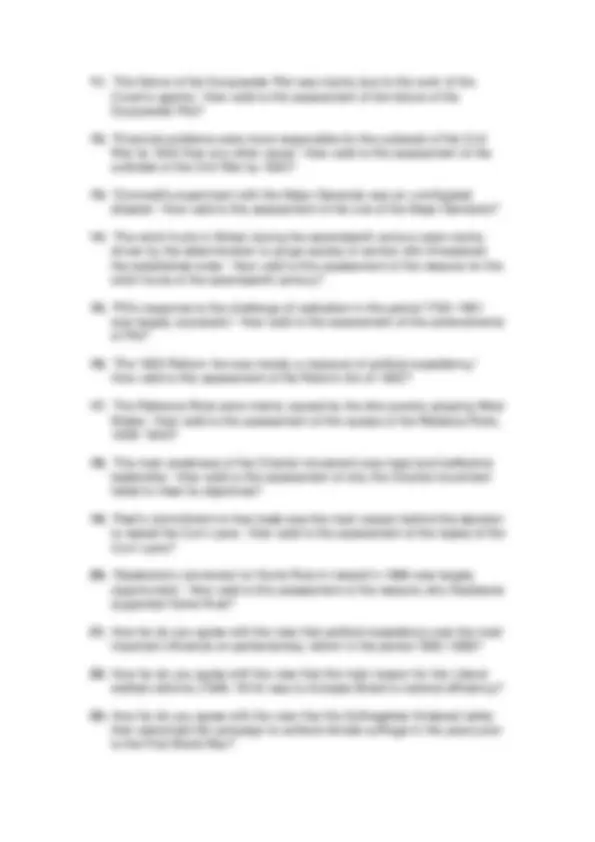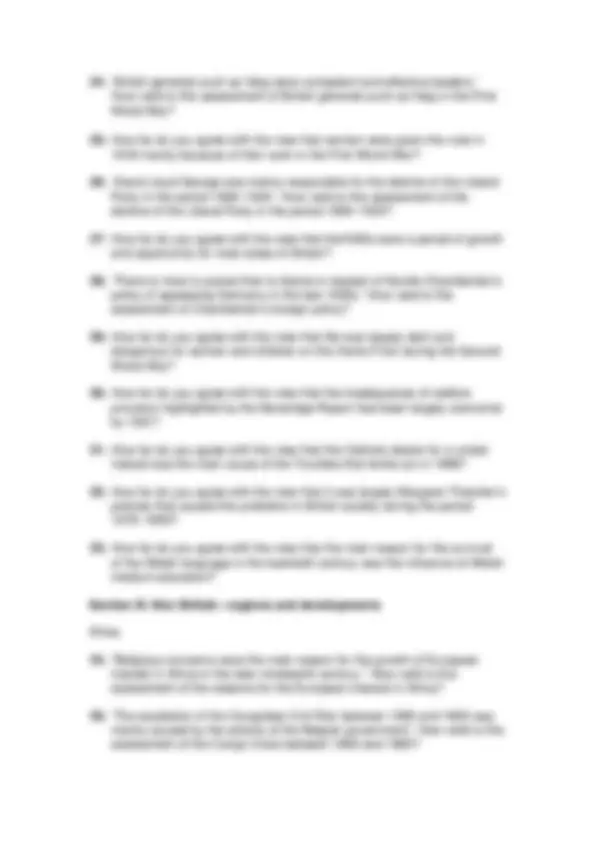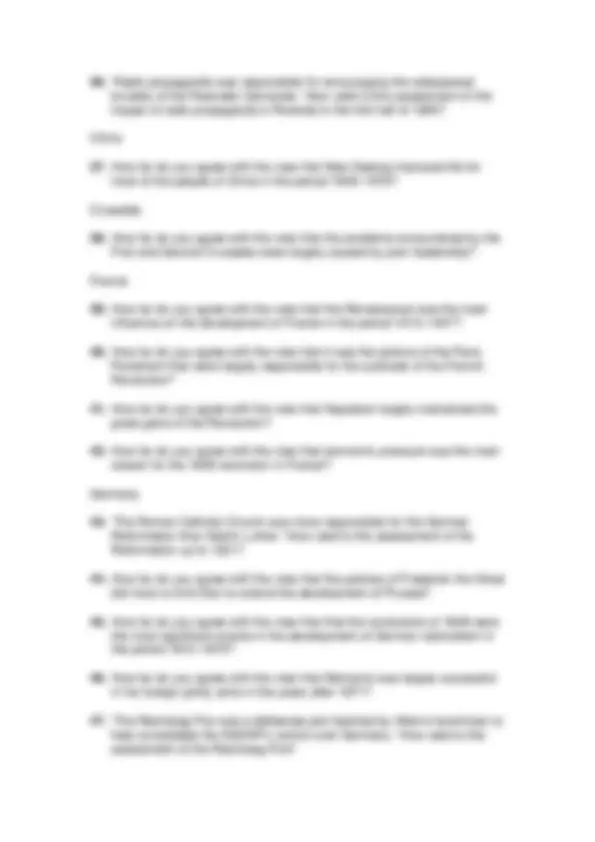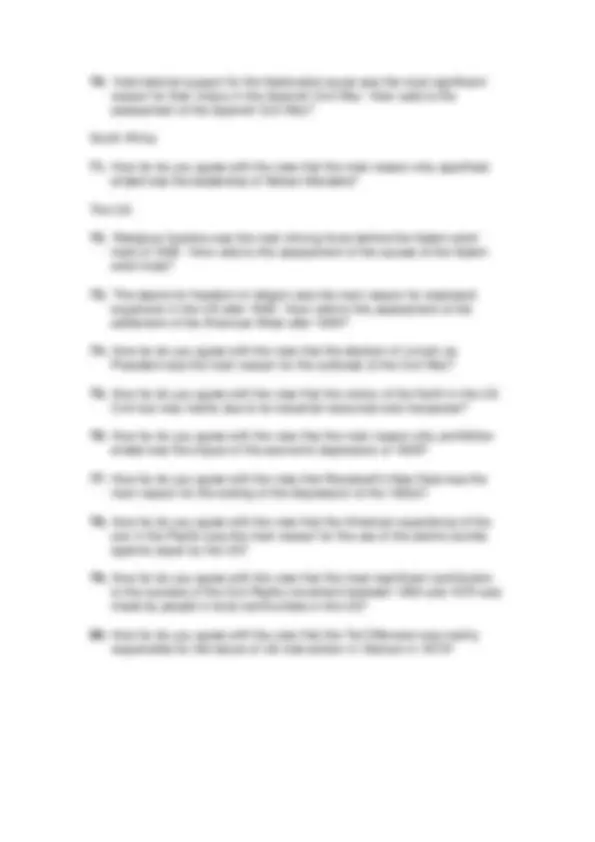






Study with the several resources on Docsity

Earn points by helping other students or get them with a premium plan


Prepare for your exams
Study with the several resources on Docsity

Earn points to download
Earn points by helping other students or get them with a premium plan
Community
Ask the community for help and clear up your study doubts
Discover the best universities in your country according to Docsity users
Free resources
Download our free guides on studying techniques, anxiety management strategies, and thesis advice from Docsity tutors
Suggested questions for the WJEC History NEA (Non-Exam Assessment) for the cycle 2020-2022. Centres can propose up to four different assignment titles, which must differ significantly from those approved in the previous cycle. The questions are arranged in two sections: Wales and England, and Non-British history, regions and developments. Each section includes various historical topics and issues for students to explore and analyze.
Typology: Lecture notes
1 / 8

This page cannot be seen from the preview
Don't miss anything!





WJEC History—Unit 5 (NEA) Suggested questions for Centre approval Cycle: 2020–
Centres may propose questions that link with their studies in Units 1 and 3 but not with their chosen Depth Study (Units 2 and 4). They may also propose questions that relate to a period of history not covered elsewhere on the course, subject to meeting the criteria for such questions.
Centres may propose up to a maximum of four different assignment titles for this cycle. The questions submitted for approval for the 2020–2022 cycle must differ significantly from those approved in the previous cycle. The questions below are offered to support centres looking to set significantly different questions for the 2020–2022 cycle.
By “differ significantly” the WJEC means that the change must be substantial. While the NEA can be on the same topic, we do not want questions being reversed or just moderately adjusted. For example:
“The Peasants’ War in Germany was the result of religious grievances.” How valid is this assessment of the origin of the Peasants’ War?
cannot become
“The Peasants’ War in Germany was the result of economic grievances.” How valid is this assessment of the origin of the Peasants’ War in Germany?
Essentially, it is the same NEA using the same material. However, the following example would be an acceptable change as it moves the scope of the study from causes to impact and is focused on the Peasants’ War from a different historical perspective:
“The Peasant’s War in Germany had a limited impact on the course of the early Reformation.” How valid is this assessment of the impact of the Peasants’ War?
Centres may adapt the questions below into any of the accepted formats for questions of this nature. The questions listed are not prescriptive and centres may propose their own issues as can individual candidates.
As the opportunity to set individually-proposed titles is designed to encourage enquires of a specialist nature, individuals are not able to select their proposed titles from the WJEC suggested questions booklet (nor from its 2017–2019 iteration).
The questions in this booklet are arranged in two sections:
Section A: The history of Wales and England
Section B: Non-British history, regions and developments
Section A
Wales and England
1. 'The success of the Norman invasion in 1066 was mainly due to their military superiority.' How valid is this assessment of the outcome of the Norman invasion of 1066? 2. How far do you agree with the view that the main impact of the invasions of Wales after 1240 was to improve the lives of the people of Wales by 1415? 3. How far do you agree with the view that the main impact of the Black Death was on the economy of Wales and England in the period 1348– 1400? 4. How far do you agree with the view that Owain Glyndwr was little more than a selfish plunderer in the period 1400–1415? 5. ‘The inadequacies of Henry VI were mainly responsible for the outbreak of civil conflict in 1455. How valid is this assessment of the causes of the Wars of the Roses? 6. How far do you agree with the view that in the period 1455–1489 the power of the nobility was the main source of disorder in the kingdom? 7. How far do you agree with the view that the period from 1509 to 1569 was largely characterised by protest, upheaval and rebellion rather than sound government? 8. ‘The Acts of Union were an instantaneous success in that they reduced Wales, in the course of a single generation, to a state of order and obedience to the law of England.’ How valid is this assessment of the impact of the Acts of Union? 9. How far do you agree with the view that the main reason for the dissolution of the monasteries by Henry VIII was that they no longer served any useful purpose? 10. How far do you agree with the view that Mary, Queen of Scots, was the greatest challenge facing Elizabeth in the period after 1568?
24. ‘British generals such as Haig were competent and effective leaders.’ How valid is this assessment of British generals such as Haig in the First World War? 25. How far do you agree with the view that women were given the vote in 1918 mainly because of their work in the First World War? 26. ‘David Lloyd George was mainly responsible for the decline of the Liberal Party in the period 1906–1924.’ How valid is this assessment of the decline of the Liberal Party in the period 1906–1924? 27. How far do you agree with the view that the1930s were a period of growth and opportunity for most areas of Britain? 28. ‘There is more to praise than to blame in respect of Neville Chamberlain’s policy of appeasing Germany in the late 1930s.’ How valid is this assessment of Chamberlain’s foreign policy? 29. How far do you agree with the view that life was largely dark and dangerous for women and children on the Home Front during the Second World War? 30. How far do you agree with the view that the inadequacies of welfare provision highlighted by the Beveridge Report had been largely overcome by 1951? 31. How far do you agree with the view that the Catholic desire for a united Ireland was the main cause of the Troubles that broke out in 1968? 32. How far do you agree with the view that it was largely Margaret Thatcher’s policies that caused the problems in British society during the period 1979–1990? 33. How far do you agree with the view that the main reason for the survival of the Welsh language in the twentieth century was the influence of Welsh medium education?
Section B: Non British—regions and developments
Africa
34. 'Religious concerns were the main reason for the growth of European interest in Africa in the later nineteenth century.’’ How valid is this assessment of the reasons for the European interest in Africa? 35. ‘The escalation of the Congolese Civil War between 1960 and 1965 was mainly caused by the actions of the Belgian government.’ How valid is this assessment of the Congo Crisis between 1960 and 1965?
36. ‘Radio propaganda was responsible for encouraging the widespread brutality of the Rwandan Genocide.’ How valid is this assessment of the impact of radio propaganda in Rwanda in the first half of 1994?
China
37. How far do you agree with the view that Mao Zedong improved life for most of the people of China in the period 1949–1976?
Crusades
38. How far do you agree with the view that the problems encountered by the First and Second Crusades were largely caused by poor leadership?
France
39. How far do you agree with the view that the Renaissance was the main influence on the development of France in the period 1515–1547? 40. How far do you agree with the view that it was the actions of the Paris Parlement that were largely responsible for the outbreak of the French Revolution? 41. How far do you agree with the view that Napoleon largely maintained the great gains of the Revolution? 42. How far do you agree with the view that economic pressure was the main reason for the 1848 revolution in France?
Germany
43. 'The Roman Catholic Church was more responsible for the German Reformation than Martin Luther.' How valid is this assessment of the Reformation up to 1521? 44. How far do you agree with the view that the policies of Frederick the Great did more to limit than to extend the development of Prussia? 45. How far do you agree with the view that that the revolutions of 1848 were the most significant events in the development of German nationalism in the period 1815–1870? 46. How far do you agree with the view that Bismarck was largely successful in his foreign policy aims in the years after 1871? 47. 'The Reichstag Fire was a deliberate plot hatched by Hitler's henchmen to help consolidate the NSDAP’s control over Germany.’ How valid is this assessment of the Reichstag Fire?
Japan
59. “In the 1930s and 1940s, Japan was able to pursue foreign wars mainly because of its rapid economic growth.” How valid is this assessment of Japanese foreign policy during this period.
The Middle East
60. How far do you agree with the view that the Ottoman Empire posed little threat to the Christian rulers of Europe in the period 1485–1603? 61. 'The main reason for the creation of Israel in 1948 was the treatment of the Jews during the Second World War.’ How valid is this assessment of the creation of the state of Israel?
Mexico
62. ‘Malinche was not complicit in the Spanish conquest of Mexico; she was a victim of it.’ How valid is this assessment of the role of Malinche during the Spanish conquest of Mexico?
Russia
63. How far do you agree with the view that Peter the Great was largely unsuccessful in his attempts to modernise Russia? 64. How far do you agree with the view that Alexander II was largely successful in his attempts to modernise Russia in the period after 1855? 65. ‘It was mainly the impact of war that caused the Russian Revolution of February 1917.’ How valid is this assessment of the causes of the Russian Revolution of February 1917? 66. How far do you agree with the view that Stalin’s main aim in the period 1924–1939 was to carry out the changes begun by Lenin? 67. 'The lives of the Russian peasants were transformed for the better in the years between 1928 and 1964.’ How valid is assessment of the peasantry in Russia? 68. How far do you agree with the view that the Battle of Stalingrad was mainly responsible for Soviet victory in the Second World War?
Spain
69. How far do you agree with the view that royal finances were the most serious problem for Philip II in his rule of Spain?
70. ‘International support for the Nationalist cause was the most significant reason for their victory in the Spanish Civil War.’ How valid is this assessment of the Spanish Civil War?
South Africa
71. How far do you agree with the view that the main reason why apartheid ended was the leadership of Nelson Mandela?
The US
72. ‘Religious hysteria was the main driving force behind the Salem witch trials of 1692.’ How valid is this assessment of the causes of the Salem witch trials? 73. 'The desire for freedom of religion was the main reason for westward expansion in the US after 1840.’ How valid is this assessment of the settlement of the American West after 1840? 74. How far do you agree with the view that the election of Lincoln as President was the main reason for the outbreak of the Civil War? 75. How far do you agree with the view that the victory of the North in the US Civil war was mainly due to its industrial resources and manpower? 76. How far do you agree with the view that the main reason why prohibition ended was the impact of the economic depression of 1929? 77. How far do you agree with the view that Roosevelt’s New Deal was the main reason for the ending of the Depression of the 1930s? 78. How far do you agree with the view that the American experience of the war in the Pacific was the main reason for the use of the atomic bombs against Japan by the US? 79. How far do you agree with the view that the most significant contribution to the success of the Civil Rights movement between 1954 and 1970 was made by people in local communities in the US? 80. How far do you agree with the view that the Tet Offensive was mainly responsible for the failure of US intervention in Vietnam in 1975?